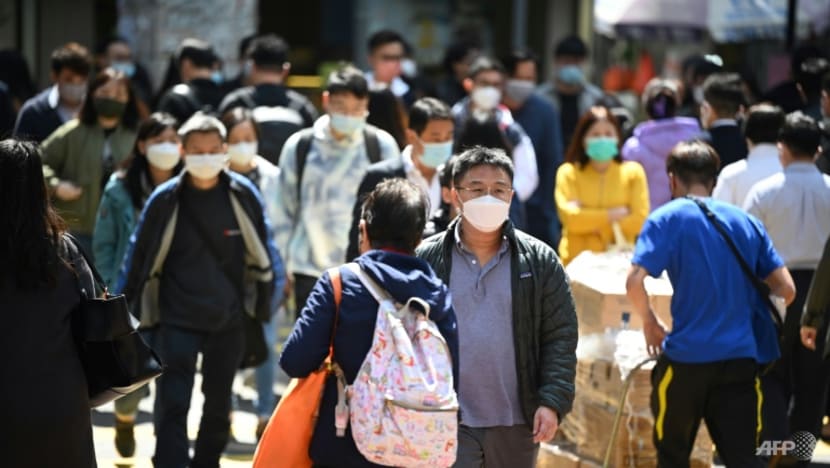Hong Kong seeks to fill brain drain gap as locals and foreigners leave city
Things are however looking up for the city as those who left the city look to return following the city's reopening.

HONG KONG: Hong Kong is racing to fill the vacancies caused by brain drain, as locals and foreigners alike leave the city for opportunities abroad.
Among those seeking a better life overseas is one resident who wanted to be known as Laura. She will leave for Australia in July, where she has received an invitation for permanent residency.
The trained nurse cited reasons such as less stress in Australia and the social unrest in Hong Kong between 2019 and 2020, as reasons for her move.
"Working as a nurse in Hong Kong is very stressful and we always lack manpower," she said.
Compensation in Australia is also better, she said, adding that her pay will be doubled if she works on weekends and night shifts.
"The political reason is definitely a turning point. The social movements occurred in 2019 and 2020, setting off a wave of emigration," she said.
She was referring to a series of protests that began in June 2019 over plans that would have allowed extradition from Hong Kong to mainland China.
The demonstrations later spread to further reflect wider demands for democratic reform, and an inquiry into alleged police brutality.
Laura is among many in her generation who have found themselves at a crossroads after the social unrest.
CHANGES IN RELOCATION PATTERNS
But it is not just the locals who are looking for greener pastures.
Foreigners, who make up 10 percent of Hong Kong's population, started to leave over the prolonged COVID-19 restrictions in the city. The effects were seen in the rental market.
In the expat enclave of Discovery Bay, luxury rents dropped 2.4 per cent in the last quarter of 2022, as demand fell on the back of tenants leaving.
Mr Patrick Groth, general manager of Hong Kong and Taiwan at Santa Fe Relocation, said that from January to September 2022, 90 per cent of his firm’s clients were outbound compared to 10 per cent inbound, which is a departure from previous years.
"Usually in our business, inbound relocation (versus) outbound will be 50-50 pre-pandemic, and then this slightly started to shift towards the end of 2020," he said.
"It really peaked in 2022."
Before the pandemic, peak moving season usually took place during the school break, from June to August.
FINDING MANPOWER
Hong Kong Chief Executive John Lee had pledged to raise the city's competitiveness when he took office, a goal that China said was pivotal to the development of the Greater Bay Area.
With about 140,000 people dropping out of Hong Kong's workforce in the last two years, the heat is on.
The city rolled out an aggressive talent trawling campaign last October, to attract graduates from the top 100 universities globally or those who have an annual salary of about US$320,000.
Under the scheme, they can come to Hong Kong without any job offer. As of February, 92 per cent of the nearly 8,400 applicants got through.
The Immigration Department said it does not collect industry specific data, but recruiters are seeing demand for jobs in the financial sector.
“Finance is still the main bread and butter in Hong Kong. So I think finance will pick up first. And eventually once the financial market has picked up, there will be more businesses for consulting, IT,” said founder and CEO at Orion Executive Search International Limited, Arnaldo Oliveira.
He added that seasoned candidates have shown more interest in moving to Hong Kong, since it's easier to get a work visa with more years of experience.
RETAINING FOREIGN STUDENTS
The answer could also lie further downstream, as more non-local students are enrolling in Hong Kong universities.
Majority are from the mainland. Other foreign students also recorded a moderate increase.
But there's been a three-year drop in those staying on after graduation. The city is trying to tackle the problem, doubling the time limit students can stay and look for jobs after graduation, from one to two years.
Among the handful who have stayed on is PhD student Jessica Sharmi.
The medical affairs associate at Pfizer said the job hunt was not without challenges, partly because many job advertisements sought candidates fluent in Cantonese, which she is not.
"Some actually asked for you to be even able to write and read Chinese," said the Jordan national.
She was "lucky" to land the job, she said.
"I also think that the industry is moving towards being more open to foreigners," she added.
THINGS LOOKING UP
Things are looking up for the city since the lifting of pandemic restrictions. Some who have left the city are starting to have a change of heart.
In the past two months, immigration business related to application of work permits for employees has increased by more than 25 per cent, noted Mr Groth.
"When we started to realise that most of the COVID restrictions were going to be lifted, we started to have our corporate clients approaching us and telling us that they have candidates and employees moving back to Hong Kong,” he said.
Similarly, Mr Oliveira said that more and more queries have come in following the reopening of borders.
“(There have been) over a hundred in the past few weeks, compared to when the borders were locked, people were more reluctant to move around,” he said.

















